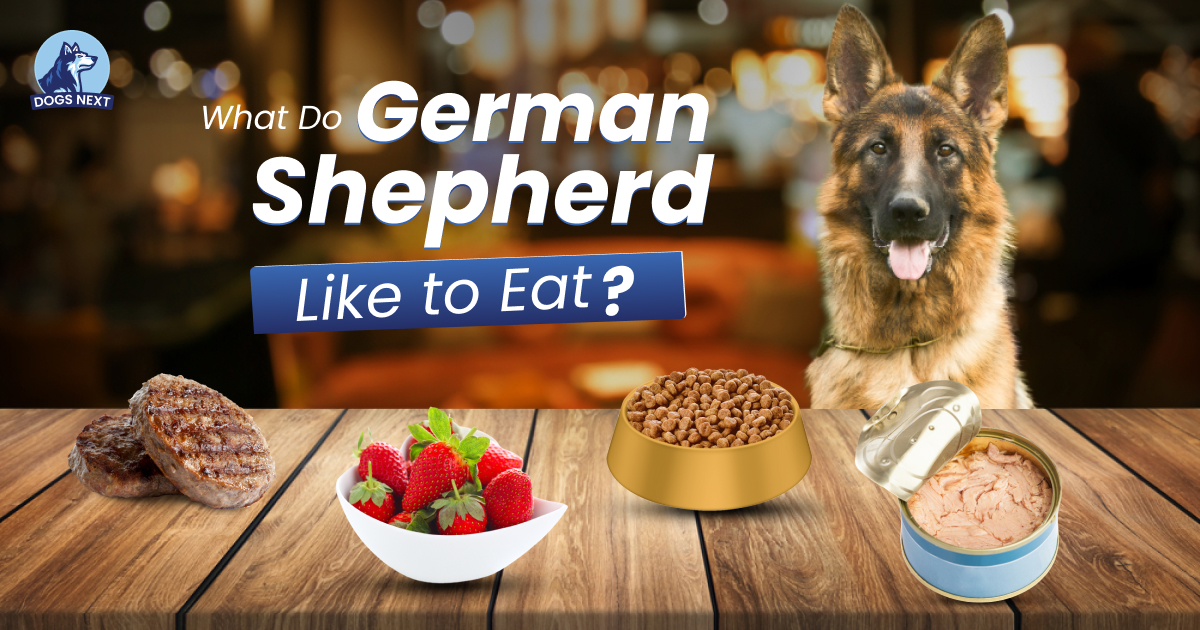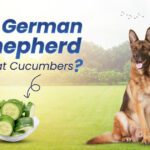German Shepherds are active and intelligent dogs that require a healthy and balanced diet to thrive. As a responsible pet owner, it’s important to know what foods are safe and healthy for your furry friend.
From high-quality protein sources to fruits and vegetables, we’ll provide a complete list of safe and healthy pet foods for your dog. We’ll also discuss the foods that should be avoided or restricted in a German Shepherd’s diet, as well as provide tips on how to choose the right dog food for your pet.
Table of Contents
What German Shepherds Can Eat
German Shepherds are omnivores and require a balanced diet that includes a variety of protein sources, fruits, vegetables, and grains. Here are some foods that German Shepherds can safely eat:
High-quality protein sources
German Shepherds need a lot of protein to support their active lifestyle. Some good sources of protein include raw chicken, beef, lamb, turkey, and fish.
Vegetables and fruits
Vegetables can be healthy and tasty treats for your pet. This is a good source of Vitamin. German Shepherds can eat a variety of vegetables and fruits, including carrots, sweet potatoes, green beans, apples, guava, and bananas.
Grains
While some dogs may be sensitive to grains, others can tolerate them well. Good grain sources for German Shepherds include brown rice, oats, and quinoa.
Dairy products
German Shepherds can eat plain, unsweetened yogurt and cheese in moderation.
Fish
Fish is a great adult dog food and source of omega-3 fatty acids, which can help improve your dog’s coat and skin health. Good fish sources for German Shepherds include salmon, tuna fish, and sardines.
What Do Baby German Shepherds Eat
Baby German Shepherds, or puppies, require a specialized diet to support their growth and development. Here’s what you should feed your baby German Shepherd:
- Puppy food
Choose a high-quality puppy food that’s specifically formulated for large-breed puppies. Look for a food that has a balanced ratio of protein, fat, and carbohydrates.
- Frequent feedings
Puppies need to eat more frequently than adult dogs. Feed your baby German Shepherd three to four times a day until they’re about six months old.
- Avoid human food
While it may be tempting to give your puppy scraps from the dinner table, it’s best to avoid human food altogether. Puppies have delicate digestive systems and may not be able to tolerate certain foods.
- Freshwater
Make sure your puppy has access to fresh, clean water at all times. It’s essential for their overall health and well-being.
- Treats
You can give your puppy treats in moderation, but make sure they’re healthy and specifically designed for puppies. Avoid treats that are high in fat or sugar, as these can lead to weight gain and other health problems.
It’s recommended that, do not provide your puppy with any kind of commercial dog food in his raw diet which is not good for optimal health.
A Complete List of What German Shepherds Eat
| Food Group | Specific Foods |
| Protein | Chicken, beef, lamb, turkey, fish (salmon, tuna, sardines, herring), eggs, organ meats (liver, kidney, heart) |
| Vegetables | Carrots, sweet potatoes, green beans, peas, broccoli, cauliflower, spinach, pumpkin |
| Fruits | Apples, bananas, blueberries, strawberries, oranges, watermelon, cantaloupe |
| Grains | Brown rice, oats, quinoa, barley, whole wheat pasta |
| Dairy | Plain, unsweetened yogurt, cheese (cheddar, mozzarella), cottage cheese |
| Fish | Salmon, tuna, sardines, herring |
| Other | Peanut butter (unsalted, no xylitol), coconut oil, sweet potato chews, dental chews |
What German Shepherds Cannot Eat?
Here are some examples of foods that German Shepherds should not eat:
| Food | Why It’s Harmful |
| Chocolate | Contains theobromine, which can be toxic in large amounts and cause vomiting, diarrhea, hyperactivity, seizures, and even death. |
| Grapes and Raisins | Can cause kidney failure, which can be life-threatening. |
| Onions and Garlic | Can cause anemia, which can be serious, especially if ingested in large amounts. |
| Avocado | Contains persin, which can cause vomiting and diarrhea. |
| Macadamia Nuts | Can cause lethargy, vomiting, hyperthermia, and tremors. |
| Alcohol | Can cause vomiting, diarrhea, difficulty breathing, coma, and even death. |
| Bones | Cooked bones can splinter and cause blockages or tears in the digestive tract. |
It’s important to keep these foods out of reach of your German Shepherd and to avoid giving them table scraps or human food in general, as many foods that are safe for humans can be harmful or even toxic to dogs. If you suspect that your German Shepherd has ingested any of these foods or is showing signs of illness, contact your veterinarian immediately.
How to Choose the Right Dog Food for Your German Shepherd
Choosing the right dog food for your German Shepherd is important for their overall health and well-being. Here are some tips to help you make an informed decision:
- Look for high-quality protein sources: German Shepherds are carnivores and require a diet that is high in protein. Look for dog foods that have meat or meat meal listed as the first ingredient.
- Consider your dog’s age: Puppies have different nutritional requirements than adult dogs, so it’s important to choose a food that is appropriate for their age.
- Check the ingredients: Avoid dog foods that contain fillers, artificial preservatives, food allergies, and by-products. Look for foods that have whole food ingredients like fruits, vegetables, white rice, and grains.
- Consider any special needs: If your German Shepherd has allergies or sensitivities, you may need to choose a food that is grain-free or contains specific protein sources.
- Consult with your veterinarian: Your veterinarian can help you choose the best dog food for your German Shepherd based on their individual needs and health history.
Homemade Food Recipes for German Shepherds
If you prefer to make home-cooked food for your dog, there are plenty of homemade recipes that can provide your German Shepherd with essential vitamins and nutritional benefits. Here are some ingredients that are safe and healthy for German Shepherds:
Protein sources: Chicken, beef, lamb, turkey, fish, eggs, and organ meats (liver, kidney, heart).
Vegetables: Carrots, sweet potatoes, green beans, peas, broccoli, cauliflower, spinach, pumpkin.
Fruits: Apples, bananas, blueberries, strawberries, oranges, watermelon, cantaloupe.
Grains: Brown rice, oats, quinoa, barley, whole wheat pasta.
Dairy: Plain, unsweetened yogurt, cheese (cheddar, mozzarella), cottage cheese.
Consult with your veterinarian or a veterinary nutritionist to ensure that your homemade dog food recipe is safe and appropriate for your German Shepherd.
Frequently Asked Questions
Q: What can a German Shepherd not eat?
Ans: German Shepherds should not eat chocolate, grapes, raisins, onions, garlic, avocado, and foods high in fat or salt.
Q: What do German Shepherds like the most?
Ans: German Shepherds enjoy a variety of foods, but their favorites often include meat, fish, and dairy products.
Q: Can German Shepherds eat fruit?
Ans: Yes, German Shepherds can eat some fruits, such as apples, blueberries, and bananas, but in moderation.
Q: Can German Shepherds have peanut butter?
Ans: Yes, German Shepherds can have peanut butter, but make sure it does not contain xylitol, which is toxic to dogs.
Q: Can German shepherd eat a banana?
Ans: Yes, German Shepherds can eat bananas in moderation as they are a good source of vitamins and minerals.
Q: What human food can German shepherds eat?
Ans: Some human foods that German Shepherds can eat include lean meat, cooked eggs, brown rice, and vegetables like carrots and broccoli.
Q: What can German shepherd puppies eat?
Ans: German Shepherd puppies can eat specially formulated puppy food, which provides them with the nutrients they need for healthy growth and development.
Q: What vegetables can German shepherds eat?
Ans: German Shepherds can eat many vegetables, including carrots, green beans, and spinach, but avoid giving them vegetables like onions and garlic.
Conclusion
In conclusion, it’s essential to provide your German Shepherd with a balanced and nutritious diet that meets their specific nutritional needs. Knowing what foods are safe and healthy for your German Shepherd to eat, as well as which foods to avoid, can help keep your dog happy and healthy for years to come.
When choosing a dog food, look for high-quality protein sources, and whole food ingredients, and consider your dog’s age and any special needs they may have. Consulting with your veterinarian can also help ensure that you’re providing your German Shepherd with the best possible nutrition.

I’m David, an expert contributor and writer, with two furry friends of my own, I know the challenges of raising and caring for dogs. From training to nutrition and health, my goal is to provide valuable insights and advice to help create strong bonds and happy, healthy lives. Find me in Twitter.




